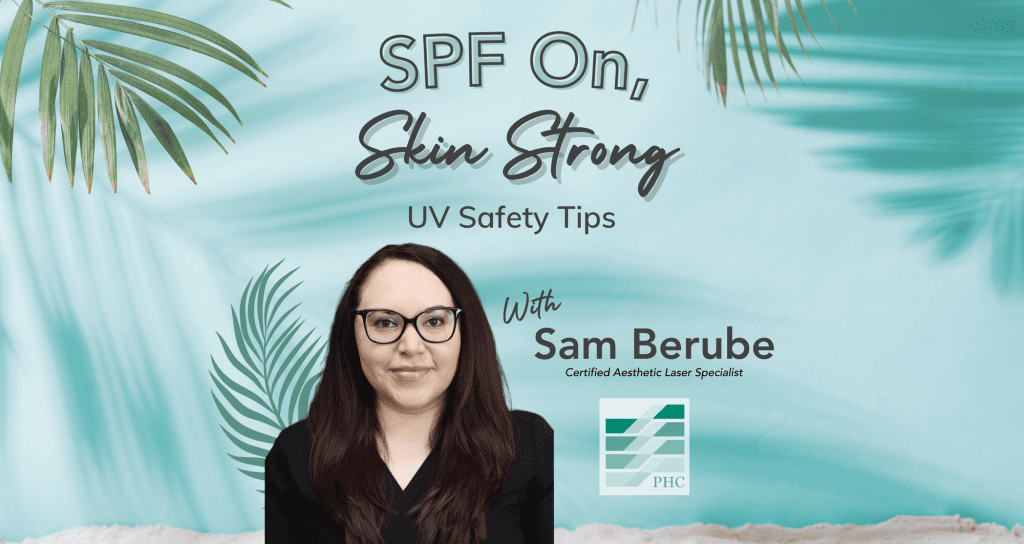Summer is here!!!
Whether you’re going to the beach or simply taking your dog out for a walk, remember to always bring your sunscreen to protect yourself from UV rays. This helps to prevent skin aging caused by the sun and protect against skin cancers.
Yet with so many sun-protection options to choose from, it may be hard to decide which one is best for you since all sunscreens are not created equal. With July being UV Safety Awareness Month, we are excited to provide some helpful tips and answer some common questions on how to choose a sunscreen that protects against both UVA and UVB rays.
– What type of sunscreen should you use?
Simple: The one you will use every day, all year long and reapply every 2 hours if needed.
– What is a broad spectrum sunscreen?
Broad Spectrum sunscreen protects against the skin from both UVA and UVB rays, and when used as directed, a daily use of facial or body sunscreen can help prevent sun damage that contributes to premature aging, as well as skin cancer.
- UVA= Aging rays
Consistent through the year and responsible for the appearance of skin wrinkling, discoloration and loss of elasticity.Fun Fact: These rays can penetrate through clouds, glass, and upper layers of the skin causing damage to valuable proteins like collagen and elastin that gives the skin it’s volume, structure, and glow. UVA damage is a threat year- round, even on overcast days, when you are driving, or even when you’re indoors near a window. - UVB=Burning rays
UVB rays are stronger in the summer and are responsible for sunburns and can contribute to skin cancers. They do not penetrate as deeply as UVA rays, but are also dangerous to the skin’s health.
– Mineral VS Chemical Sunscreens?
To better understand the various types of sunscreens, ingredients, and formulations, taking a closer look at mineral vs. chemical sunscreen options is an ideal place to start. The main difference between physical and chemical sunscreens comes down to the active UV-filtering ingredients. In fact, these two types of sunscreens work in different ways to protect the skin from the sun.
THE MAIN DIFFERENCE BETWEEN PHYSICAL AND CHEMICAL SUNSCREENS COMES DOWN TO THE ACTIVE UV-FILTERING INGREDIENTS.
Mineral (or physical) sunscreens are formulated with inorganic UV filters such as zinc oxide and/or titanium dioxide. The difference between physical and chemical sunscreen is that mineral-based active ingredients sit on the surface of the skin and reflect the sun’s rays.
PROS:
- Generally a better fit for sensitive skin
- May offer more hydrating benefits
- Often recommended after professional office-based treatments such as chemical peels, microneedling or laser treatments.
CONS:
- More moisturizing formulas can feel heavy on the skin
- May be more difficult to blend into the skin, however newer matte and tinted formulations help minimize a white cast and can leave the skin with a smooth, even appearance
Chemical based sunscreens are formulated with organic UV-blockers. A few ingredient names include avobenzone, homosalate, octisalate, and octocrylene. When comparing mineral vs. chemical sunscreen, chemical-based formulas are absorbed into the skin where they absorb UV rays and convert them into heat that is released from the body.
PROS:
- Ideal for water-resistant formulations used for swimming and outdoor activities
- Generally, is absorbed quickly into the skin
- Does not leave skin with a white cast
CONS:
- May not be well-tolerated by sensitive skin
– Choosing a sunscreen based on SPF:
SPF stands for Sun Protection Factor. The number tells you how long the sun’s UVB rays would take to redden your skin if you apply the sunscreen exactly as directed compared with the amount of time without sunscreen. So, if you use an SPF 30 product properly, it would take you 30 times longer to burn than if you used no sunscreen.
SPF 15: Ideal for occasional exposure, like walking your dog or driving to work.
SPF 30 or higher: Necessary for extended outdoor activities, including distance running, hiking, swimming and outdoor sports. SPF 30 is a must if you work outdoors.
Water resistant and very water resistant: For swimming or intense exercise. No sunscreen is waterproof; they all eventually wash off. Sunscreens labeled water resistant are tested to be effective for up to 40 minutes of swimming, while very water-resistant sunscreens stay effective for up to 80 minutes in the water.
– When to apply sunscreen and how much?
The answer is everyday! Daily use is non-negotiable for optimizing the health and appearance of the skin. Whether you choose mineral vs. chemical sunscreen, it’s imperative to apply sun protection correctly. Applying a generous, even layer to the face, neck, and chest 15 minutes before sun exposure should be the final step of your morning skincare regimen before you apply make-up. For larger areas such as arms and legs apply 30 minutes before venturing outside to allow the sunscreen to bind to your skin.
It’s a fact that most people do not apply enough sunscreen to obtain the level of protection stated on the bottle. As a general rule, a nickel-sized dollop should be used for the face alone, while the equivalent of a shot glass (three tablespoons) of sunscreen is necessary to protect exposed areas of the face and body.
REAPPLY, REAPPLY, REAPPLY
It’s also important to reapply sunscreen after swimming, sweating, immediately after towel drying, and at least every two hours as needed.
– How to choose a sunscreen?
With so many available sunscreens in the market, it helps to narrow down your selection based on several key factors.
- Try to choose a broad spectrum sunscreen so you know your skin is shielded from UVA and UVB rays.
- Make sure the sunscreen you’re considering is appropriate for your skin type, skin area or daily activities.
- Ex: Face- dry, oily, combination or sensitive skin.
- Ex: Swimming or hiking- water resistant
- What type of sunscreen to use: Mineral based (or physical) vs chemical based.
- What level of SPF (Sun Protection Factor) protection to use?
- Ex: Face SPF 30-50 vs body SPF 30 or higher depending activities.
- Choose a sunscreen that you can integrate into your routine everyday
- Ex: Tint or no tint? Outdoor activities or everyday cosmetically elegant?
- Lastly, choose a sunscreen you will be willing to reapply if needed. There are a wide variety of options including powder sunscreens that can be applied over make-up or a non-tinted option to leave your skin looking flawless no matter the occasion.
Keep in mind that while crucial, sunscreen alone is not enough. Seek the shade whenever possible, wear sun-safe clothing, a wide-brimmed hat and UV-blocking sunglasses, for a complete sun safety strategy.
Live life to the fullest, but in a safe way!
Written by Sam Berube, a Certified Aesthetic Laser Specialist with PHC Bellingham Family Medicine.
Office Information:
Location:
118 Kirkman Court
Troutman, NC
Accepting New Patients!







